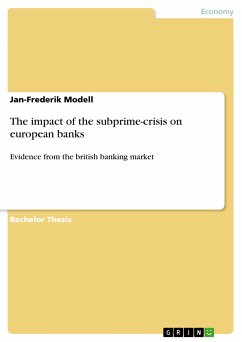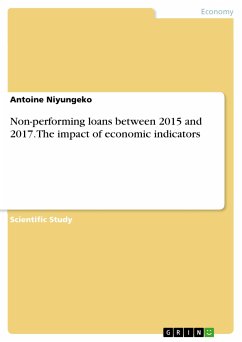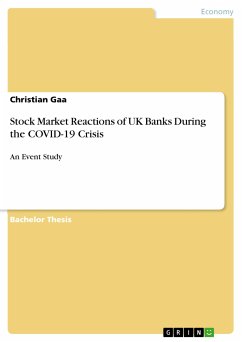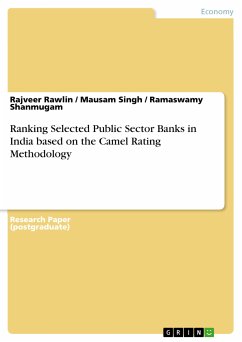
The impact of the subprime-crisis on european banks (eBook, PDF)
Evidence from the british banking market

PAYBACK Punkte
0 °P sammeln!
Bachelor Thesis from the year 2008 in the subject Business economics - Banking, Stock Exchanges, Insurance, Accounting, grade: 1,2, European Business School - International University Schloß Reichartshausen Oestrich-Winkel, language: English, abstract: The US subprime-crisis became a headline in the global media starting in February 2007 after the US housing market had already shown first signs of a slowdown in late 2006 (DiMartino & Duca, 2007, p. 1). Previously, the US housing market had enjoyed a favorable environment, especially from 2002 to 2005, which was characterized by low interest r...
Bachelor Thesis from the year 2008 in the subject Business economics - Banking, Stock Exchanges, Insurance, Accounting, grade: 1,2, European Business School - International University Schloß Reichartshausen Oestrich-Winkel, language: English, abstract: The US subprime-crisis became a headline in the global media starting in February 2007 after the US housing market had already shown first signs of a slowdown in late 2006 (DiMartino & Duca, 2007, p. 1). Previously, the US housing market had enjoyed a favorable environment, especially from 2002 to 2005, which was characterized by low interest rates, rising house values, and increasing home financing possibilities through subprime mortgages (Krinsman, 2007, pp. 13-14). However, more and more events were published during the year by US mortgage brokers, international investment banks, and central banks around the world that presented a picture which caused today's perception of the subprime-crisis. What's more, the subprime-crisis is far from being over: an end to the crisis is not yet in sight. One rather unique characteristic of this crisis is that its actual basis is the delinquencies and defaults of subprime single-family home mortgages in the US (Kiff & Mills, 2007, p. 3) which is commonly not regarded to be of great relevance for the international capital markets. However, taking into account the originate and distribute business model of US mortgage brokers in connection with the securitization of these mortgages into various types of securities that are traded on a global basis, it is not surprising to observe that banks and investment funds around the world were invested into these securities. Before the crisis started, only a few banks or funds considered the liquidity of these securities when investing significant amounts of money in them because they focused on maximizing their returns. But, when larger problems in the US subprime mortgage market became evident, liquidity became the major concern for investors and investor preferences significantly shifted to safer assets such as government bonds (Fender & Hördahl, 2007, pp. 9-11). This caused severe problems in the money market, which ultimately brought the crisis across the Atlantic to Europe. Moreover, funding problems emerged and caused the first bank run in Europe in decades when depositors in Britain started to queue outside Northern Rock branches for hours to withdraw their deposits in light of fears that the bank might have to file for bankruptcy (The Economist, 2007a, para. 28).
Dieser Download kann aus rechtlichen Gründen nur mit Rechnungsadresse in A, B, BG, CY, CZ, D, DK, EW, E, FIN, F, GR, HR, H, IRL, I, LT, L, LR, M, NL, PL, P, R, S, SLO, SK ausgeliefert werden.













